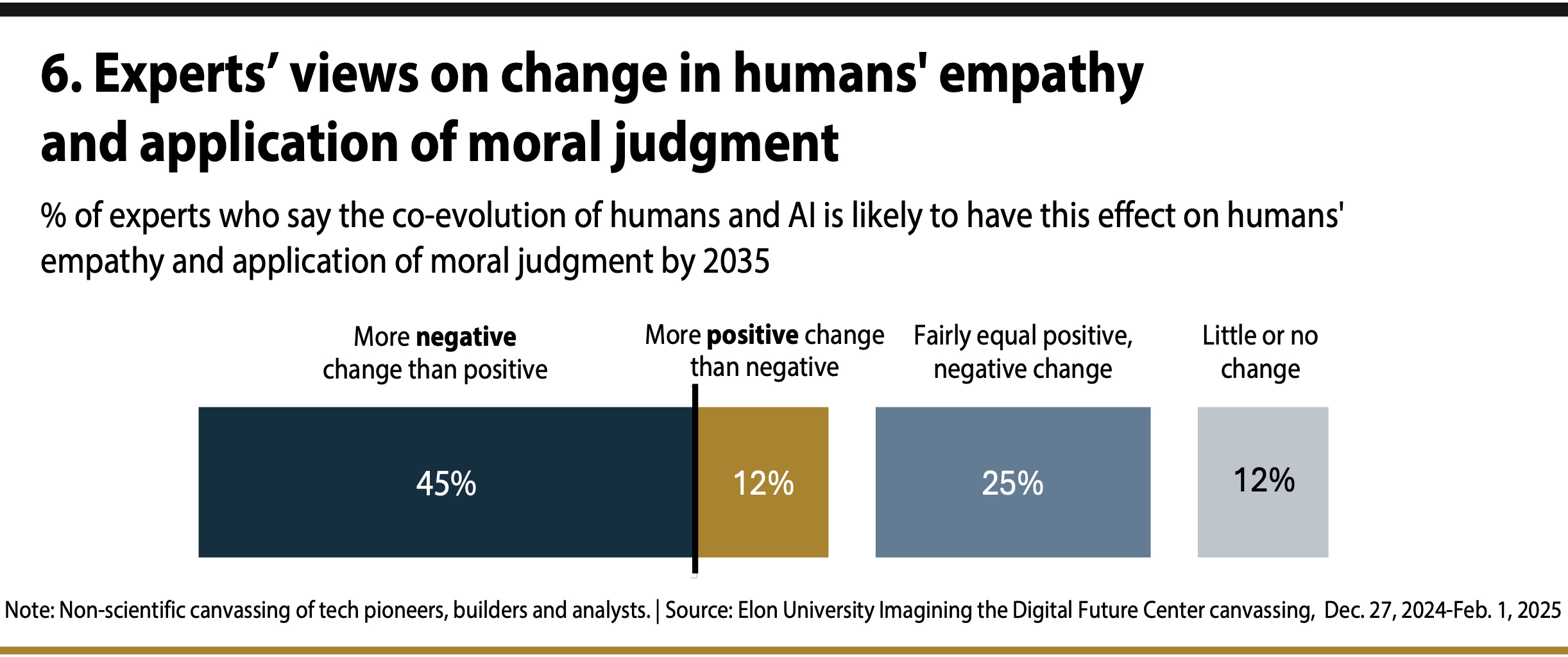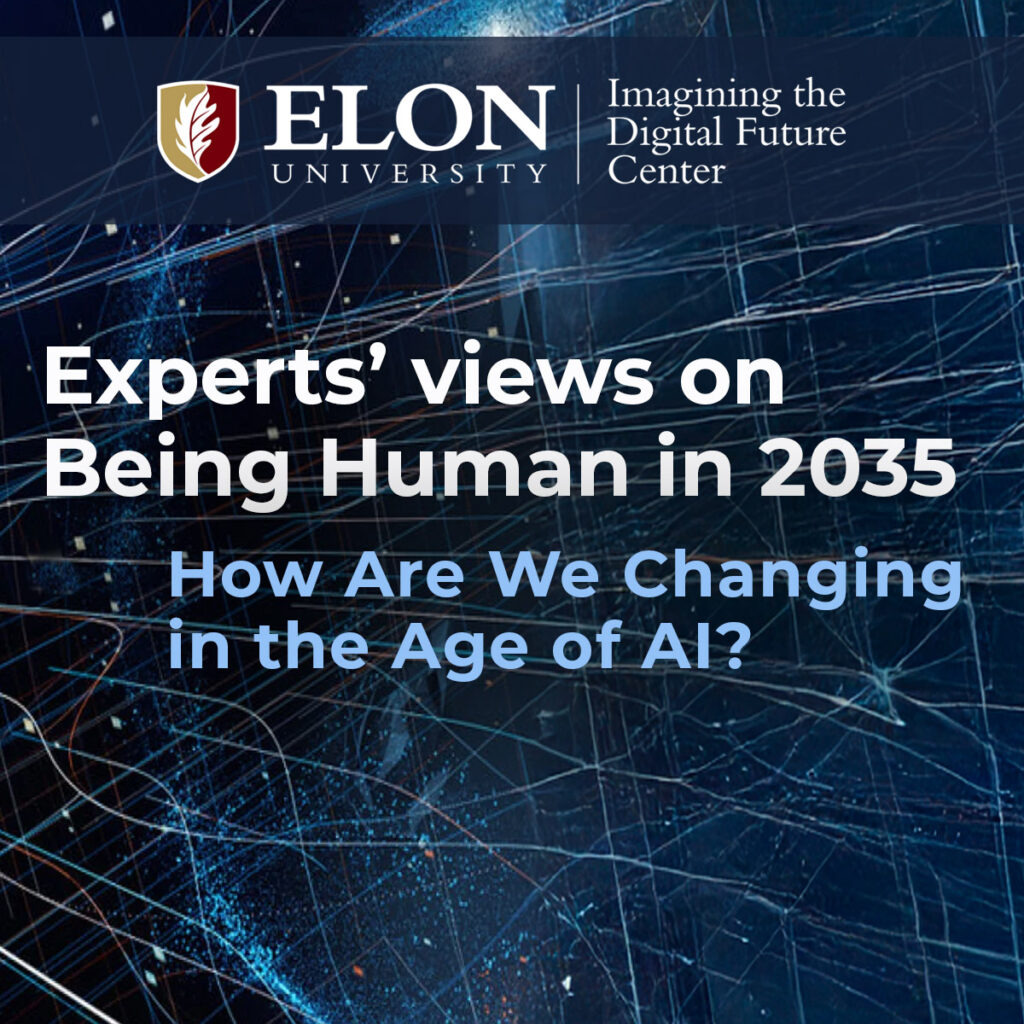

These experts expected in 2025 that by 2035 there will be…
45% – More negative change than positive change
12% – More positive change than negative change
25% – Fairly equal positive and negative change
12% – Little to no change
Machine intelligence is being trained to express human-like empathy and kindness in transactions, and it is already being used to make data-based judgments in court decisions, hiring, mortgage applications and more. Many of these experts expressed concerns about AI’s impact on human empathy and moral judgment. Some worry that if moral and ethical decision-making is outsourced to AI at the same time that human-to-human in-person connections are being diminished, people may lose the ability to engage in the hard work of dealing with moral dilemmas critically. That, in concert with other diminished human capabilities, could reduce people’s abilities for ethical reasoning and remove them from a sense of personal responsibility.
A selection of related quotes extracted from these experts’ longer essays:

“As the interaction between AI systems and human deepens, core human traits like creativity, empathy and reasoning will evolve and continue to prevail as the main differentiators of human qualities and attributes that AI systems and computer algorithms still lack and may not be able to fully develop. Maintaining a balance between embracing the benefits of AI while preserving core traits and human behaviors will be the next race to preserving the future of our existence in a fully connected and AI driven society.” – Cristos Velasco, international practitioner in cyberspace law and regulation and board member at the Center for AI and Digital Policy, based in Mannheim, Germany

“Memory, numeracy, organizational capabilities, moral judgment – all of these will be diminished. AI will be tasked to remember for us. … We will not need to strategize in order to organize our lives because AI will be faster and more accurate than us in organizing our spaces, our agenda, our planning, our strategies, our communication with others. All of this is likely to result in the diminishment of our capacity for moral judgment. AI will be used by many people to take shortcuts to making moral and ethical decisions while leaving them in the dark about how those decisions are made. AI is already leading to the fragmentation and dehumanization of work.” – Giacomo Mazzone, global project director for the United Nations Office for Disaster Risk Reduction

“Will AI improve our morals? No. Will it eradicate our inclinations toward sin? Hardly. Instead, it will invent new ways to do both – offering tools for both crime and security, for both deception and enlightenment. … Some say that this opens the possibility for advanced AIs of the future to reach ‘divine‘ characteristics, such as omnipotence, omniscience and omnipresence, potentially pushing humanity out of its linear comfort zone and narrowing our sense of human nature.” – David Porush, writer and longtime professor at Rensselaer Polytechnic Institute

“Only when we are free – truly free to make mistakes, to diverge from the norm, to act irrationally at times – can we become the morally responsible individuals that Kant envisioned. This capacity for moral autonomy also demands that we recognize the equal freedom of others as valuable as our own. Surveillance, AI-driven recommendations, manipulations or algorithms designed to rely on patterns of what is defined as ‘normal’ may threaten this essential freedom. They create subtle pressures to conform, whether through peer pressure and corporate and state control on social media, or in future maybe even through the silent monitoring of our thoughts via brain-computer-interfaces. The implications of such control are profound: if we are being constantly watched, or even influenced in ways we are unaware of, our capacity to act freely – to choose differently, to be morally responsible – could be deeply compromised.” – Evelyne Tauchnitz, senior fellow at the Institute of Social Ethics at the University of Lucerne, Switzerland

“Critically, much of the norm of human interaction, behavior and essence, is also likely to continue to be driven by major economic forces. Capitalism, marketing, attention economics, precarious work, competition and inequality are amongst the forces that seem poised to shape the design of AI systems, human-AI interactions, and, ultimately, human life. Thus, while an ‘Oasis‘-style virtual world with unlimited human-AI-enabled creativity and empathy could evolve in theory, it‘s likely that a major AI-VR environment will be (at least as) replete with marketing, attention-seeking mechanisms and various unhealthy and unfortunately predatory behaviors. The essence of our cultural and economic milieu, therefore, seems likely to heavily mediate how human-AI interactions shape human essence.” – Daniel S. Schiff, co-director of the Governance and Responsible AI Lab at Purdue University

“There is greater focus in society on building up and developing human skills that literature termed as ‘soft skills’ back in 2025. These are empathy, connection, listening, creativity and communication. As AI has taken on various responsibilities to manage tasks that require basic intelligence, humans are concentrating on exercising their soft skills such as how to connect with other humans. Refining the human tasks performed by AI to fit human life and interactions has heightened humans’ awareness of their presence and led to greater exercise of more-intuitive human capabilities. The expanding interactions between humans and AI have resulted in a continuous reevaluation of core human traits, emphasizing adaptability, empathy and a sense of purpose.” – Rabia Yasmeen, senior consultant for Euromonitor International based in Dubai, UAE

“Machines and technologies have always played a key role in the construction of how nations and civilizations perceive themselves. Human dependence, adaptations and appropriations of technologies will evolve through time and will be tested in terms of their relevance, social harms, effacement of human norms, empathy and rights. Machine learning and algorithms will be cued through human behaviour and conversely these will in time cue us in terms of our responses on platforms and utilizing technological interfaces to manipulate human senses. There is an iterative process at play.” – Yasmin Ibrahim, professor of digital economy and culture at Queen Mary University of London
Continue reading: Clicking on the bottom link on each of the next pages leads you through each of the full pages on the 12 Human Traits. Up next – people’s native agency and their ability to act independently in the world


